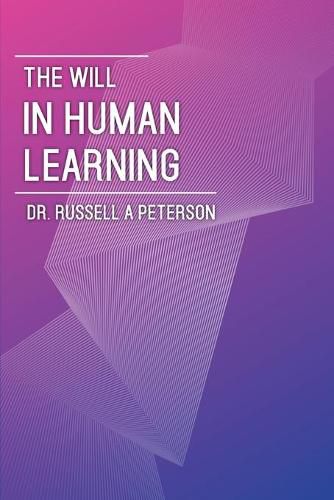Readings Newsletter
Become a Readings Member to make your shopping experience even easier.
Sign in or sign up for free!
You’re not far away from qualifying for FREE standard shipping within Australia
You’ve qualified for FREE standard shipping within Australia
The cart is loading…






This title is printed to order. This book may have been self-published. If so, we cannot guarantee the quality of the content. In the main most books will have gone through the editing process however some may not. We therefore suggest that you be aware of this before ordering this book. If in doubt check either the author or publisher’s details as we are unable to accept any returns unless they are faulty. Please contact us if you have any questions.
INTRODUCTION
Even a cursory glance at the literature in the science of learning theory alerts us to a flagrant omission which, only gradually, is being corrected. I refer to what many epistemologists, in guarded and hushed tones, speak of as the human will. No one will deny there have been attempts to provide synonyms, substitute phraseology, all of which have fallen far short of their good intentions. These are the concepts of motivation, spirit, and even drive. The more sophisticated theorists have proven a little braver and used the word psyche, in spite of its many and differing connotations. Those taking this route have failed to sense the true potential inherent in the mind concept of will.In the following pages I have defined will in relation to the cognitive and affective domains of the mind. What I have shown is that no learning takes place unless the mind experiences its subject or object. In essence, the mind must will to experience; only in this way does the mind find meaning. To experience, the mind must be fully functional, that is, there must be balance among its domains, namely, the cognitive, conative and affective. Otherwise, the mind is subject to the epistemological weakness of the rationalization process. In this process, the mind does not validate its values and, therefore, its learning is conditional. The apprehended knowledge is uncertain and remains as question.Learning theory is an intriguing subject for discussion. To assist in the discussions I have included a number of simple case studies. In a sense, the material is all open-ended. This has been my intention. The approach will, I hope, stimulate considerable thought. If it does, I will have succeeded in my endeavor to bring before the learning theorist the need to seriously consider the place (therefore the task) of the will in human learning.
$9.00 standard shipping within Australia
FREE standard shipping within Australia for orders over $100.00
Express & International shipping calculated at checkout
This title is printed to order. This book may have been self-published. If so, we cannot guarantee the quality of the content. In the main most books will have gone through the editing process however some may not. We therefore suggest that you be aware of this before ordering this book. If in doubt check either the author or publisher’s details as we are unable to accept any returns unless they are faulty. Please contact us if you have any questions.
INTRODUCTION
Even a cursory glance at the literature in the science of learning theory alerts us to a flagrant omission which, only gradually, is being corrected. I refer to what many epistemologists, in guarded and hushed tones, speak of as the human will. No one will deny there have been attempts to provide synonyms, substitute phraseology, all of which have fallen far short of their good intentions. These are the concepts of motivation, spirit, and even drive. The more sophisticated theorists have proven a little braver and used the word psyche, in spite of its many and differing connotations. Those taking this route have failed to sense the true potential inherent in the mind concept of will.In the following pages I have defined will in relation to the cognitive and affective domains of the mind. What I have shown is that no learning takes place unless the mind experiences its subject or object. In essence, the mind must will to experience; only in this way does the mind find meaning. To experience, the mind must be fully functional, that is, there must be balance among its domains, namely, the cognitive, conative and affective. Otherwise, the mind is subject to the epistemological weakness of the rationalization process. In this process, the mind does not validate its values and, therefore, its learning is conditional. The apprehended knowledge is uncertain and remains as question.Learning theory is an intriguing subject for discussion. To assist in the discussions I have included a number of simple case studies. In a sense, the material is all open-ended. This has been my intention. The approach will, I hope, stimulate considerable thought. If it does, I will have succeeded in my endeavor to bring before the learning theorist the need to seriously consider the place (therefore the task) of the will in human learning.